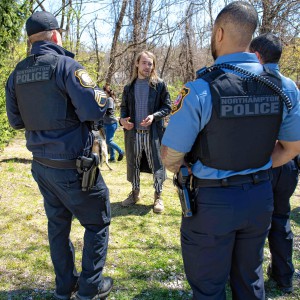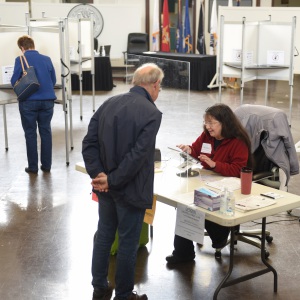Columnist Susan Wozniak: Need to keep educational horizons open

Susan Wozniak
|
Published: 03-21-2024 6:03 PM
Modified: 03-22-2024 7:41 PM |
I have written about education before. About the need to teach geography in elementary school. Supporting independent reading. Having elementary school students rotate among three teachers during the day: one to teach reading and writing; one to teach math and science; one to teach social studies. About the need to teach government.
This week, I heard several people criticize schools. It began with my daughter, who has a viola, a violin and a cello. She no longer plays, but she did not want to give her instruments away. She spoke to a principal about lending her instruments to children interested in learning to play music. As there was no music program, the principal refused the loan.
She was crushed. Since second grade, when a demonstration was held by various rising musicians, my daughter chose the viola, which she played in the school orchestra. Later, she wanted to be in the marching band and learned the trumpet.
The day after the talk with my daughter, I heard, among several women, an argument in favor of teaching civics. Civics is a word derived from the Latin, which means “related to citizens.” I knew another definition: the teaching of the privileges and duties of the citizenry. A class called government is based upon civics but also includes the definitions of various forms of government.
In my research, I found an article titled “Civic education in the United States” on Wikipedia. It claimed that “All 50 states have social studies standards which include civics and government.”
Standards, to me, sounds vague and, perhaps, ignored. However, the American Federation of Teachers published an article, “A Look at Civics Education in the United States,” that begins by telling the reader that “civic knowledge and public education are at an all-time low.”
The teachers union’s “Look” presents a different assessment of the teaching of civics and government in that only nine states and the District of Columbia offer a full year of government or civics. Thirty states require a semester, while the last 11 states are without a civics mandate.
The authors of “The State of Civics Education,” Sarah Shapiro and Catherine Brown, from which the teachers union report was drawn, endorse the teaching of qualities, such as responsibility, and some basic terms, like election and appointment, to early elementary students to prepare them for real work in high school. As the students develop and grow, they can begin what the authors and the nonprofit Generation Citizen call working on “community problems.”
Article continues after...
Yesterday's Most Read Articles
 Police report details grisly crime scene in Greenfield
Police report details grisly crime scene in Greenfield
 Super defers Amherst middle school principal pick to successor; one finalist says decision is retaliation for lawsuit
Super defers Amherst middle school principal pick to successor; one finalist says decision is retaliation for lawsuit
 Homeless camp in Northampton ordered to disperse
Homeless camp in Northampton ordered to disperse
 Authorities ID victim in Greenfield slaying
Authorities ID victim in Greenfield slaying
 Haydenville residents resist Greenway trail plan, float alternative design
Haydenville residents resist Greenway trail plan, float alternative design
 Locking up carbon for good: Easthampton inventor’s CO2 removal system turns biomass into biochar
Locking up carbon for good: Easthampton inventor’s CO2 removal system turns biomass into biochar
My daughter left public school after second grade for a Montessori School, where she experienced exactly the kind of program Shapiro, Brown and Generation Citizen endorse.
Let me pause here to say that neither civics nor government stand alone. They must partner with science or history or the environment or manufacturing, or many more necessities of human existence.
The Montessori kids researched “Drilling for Oil in the ANWR (Artic National Wildlife Refuge).” But their teachers did not stop at the research paper. The 10 students, escorted by two teachers and two parents, went to Washington where they presented their work to then-Sens. Ted Kennedy and John Kerry.
Granted, not all parents can afford private schools, but eager kids from grades 4 through 6 can research topics that interest them.
I have often turned to substitute teaching. I was a building sub at a high school for five years, during which I worked each year with the principal overseeing the MCAS. It is a waste of space, time and money.
A wing of the high school was devoted to the test. Regular 10th grade classes were suspended. There are rules for the administration of the test as well as rules for how to return the completed exams to the Board of Education.
I opened a few of the essay tablets. One contained a single paragraph followed by a few scribblings of, “This test is stupid.” Only one of my kids was in school when the MCAS was a necessity for graduation. He passed the essay, but he told me that he included lyrics by the band Phish.
I was in elementary school during the 1950s. We were given machine-scored “bubble tests” twice each school year, in January and June. Their purpose was to tell the student, their parents and their teacher whether the student was on, above or below grade level. That was it. There was no competition with other states or even with the schools in neighboring towns.
I am not anti-test, but this testing mania was a part of No Child Left Behind, which did more to set our nation’s schools back. Let’s correct that mistake.
Susan Wozniak has been a caseworker, a college professor and journalist. She is a mother and grandmother.

 Charlene Galenski: Blake Gilmore, a strong candidate for Deerfield’s Selectboard
Charlene Galenski: Blake Gilmore, a strong candidate for Deerfield’s Selectboard Annette Pfannebecker: Vote yes for Shores Ness and for Deerfield
Annette Pfannebecker: Vote yes for Shores Ness and for Deerfield Columnist Susan Wozniak: Rising costs long ago swamped hippie ideal
Columnist Susan Wozniak: Rising costs long ago swamped hippie ideal Guest columnist Rudy Perkins: Dangerous resolution pins ‘aggression’ on Iran
Guest columnist Rudy Perkins: Dangerous resolution pins ‘aggression’ on Iran
